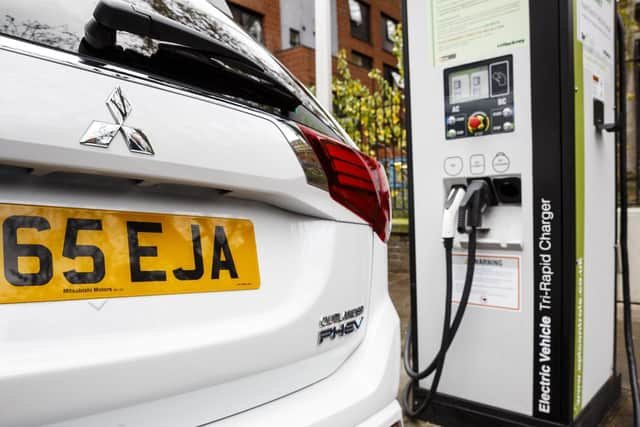Force car makers to sell more electric vehicles to cut emissions and get more on the second-hand market, says think-tank Green Alliance
Green Alliance says the Government should introduce a zero emissions vehicle mandate to promote the uptake of battery electric cars and push more onto the second hand market.
The think-tank's report says this measure, already successfully implemented in California, would require manufacturers to increase the proportion of battery electric vehicles they sell, with the need to hit interim targets between now and 2035.
Advertisement
Hide AdAdvertisement
Hide Ad

Last year, the Government announced a 2030 phase-out date for the sale of new petrol and diesel vehicles to encourage the transition to electric vehicles and said that only zero emission vehicles, such as battery electric cars, can be sold new after 2035.
According to Green Alliance, despite higher upfront costs, battery electric vehicles are cheaper to run and have fewer parts than conventional vehicles, which cuts their maintenance costs. This means that once they reach the second hand market, where the upfront costs are lower, they offer owners big savings.
Its report suggests that a new medium sized battery electric car bought today will save its owner up to £2,300 over a petrol or diesel equivalent once it reaches the second-hand market and for third-hand cars, the estimated savings are even higher, at up to £5,600.
It adds that lower-income households are much less likely to purchase new vehicles, yet there is only a limited supply of used electric vehicles.
Advertisement
Hide AdAdvertisement
Hide AdCaterina Brandmayr, head of climate policy at Green Alliance, said: “The government has sent a strong signal to carmakers about the direction of travel, it must now ensure they speed up the transition and help us all to switch by getting more electric vehicles on the road.
"This is especially important to ensure those on lower incomes can benefit from clean cars sooner, as well as cutting carbon emissions and cleaning up our air.”
The report says requiring manufacturers to sell an increasing share of battery electric vehicles will also help to expand the range of models offered on the market, making it easier for car buyers to switch, as there are currently seven times more conventional petrol and diesel models than battery electric cars.
It comes as the momentum behind electric vehicles continues with Leeds supermarket chain Asda announcing that it will provide customers with free to use electric vehicle (EV) charging points at some of its West Yorkshire stores following a new partnership with Engie.
Advertisement
Hide AdAdvertisement
Hide AdCustomers will have 24/7 access to the free charging points across 19 of the retailer’s stores, including Bradford, Killingbeck, Wakefield, Huddersfield and Middleton, Asda’s sustainability store.
And in North Yorkshire, Selby district council has announced plans for two new electric vehicle charging points in South Parade car park in Selby.
Earlier this month, the Government said the UK was "accelerating further towards a greener transport future", as it emerged that over half-a-million ultra low emission vehicles are now being driven on roads across the country.
